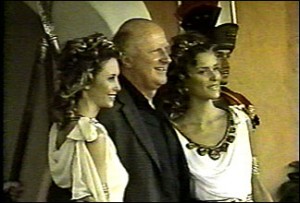In doing some background reading for my current research project on the global regulation of private wealth, I was struck by this observation about corporations from anthropologists George Marcus and Peter Dobkin Hall:
“…the internalized functions characteristic of modern, bureaucratically organized business firms has been less a means of responding to market forces than a means of eliminating them. While remaining nominally in the economic realm, corporations have increasingly become (and may, indeed, always have been) mechanisms for the maximization of social and political utilities: identity, status, power, influence.”
—from Lives in Trust: The Fortunes of Dynastic Families in Late Twentieth-Century America (1992: 257; emphasis mine)
My first reaction upon reading this was: “Preach it!” The phrase that really grabbed my attention was: “and may, indeed, always have been.” As in, maybe corporations have always been about enhancing the personal attributes—“identity, status, power and influence”—of corporate executives.
I’ve been waiting for someone to say that in print for a long time. To say that the rhetoric used to justify the existence and behavior of corporations, expressed in set phrases like “adding shareholder value,” is about as convincing as the praise of the court officials in “The Emperor’s New Clothes.”

Whenever some executive piously intones these set phrases, it makes him (and it is usually a him) sound like an altruist who somehow got lost en route to the local Peace Corps office and wound up in the C-suite instead: “Oh well, now I’ll have to accept a multi-million-dollar salary and a private jet instead of teaching apiculture in Zambia. Fiddlesticks!” It’s ludicrous, and yet rarely does anyone in social science speak up against this farcical claim that people run companies in order to make other people—specifically, shareholders—rich.
My second reaction was to think of Dennis Kozlowski—the CEO of Tyco, who used his firm’s money to pay for his wife’s birthday party (with the infamous vodka-peeing ice sculpture), along with a $6,000 shower curtain, $15,000 dog-shaped umbrella stand, and other accoutrements of conspicuous consumption.

Before he went to prison for what the Wall Street Journal (!) termed “looting Tyco of some $600 million,” Kozlowski sure had a lot to say about shareholder value.When rumors started to spread in early 2002 about his misuse of company funds, he had Tyco’s PR department issue a press release stating:
“We are holding this meeting to respond to the continuing stream of baseless rumors that are depressing our stock, and to discuss ways in which we plan to enhance shareholder and debt-holder value.”
Memo to haters: Dennis Kozlowski Wants to Make You Rich.
Amazingly, that was the actual title of an article published by Smart Money magazine 9 months before the SEC filed larceny charges against Kozlowski. Such is the power of the executives-as-philanthropists-manqués trope that a reputable financial publication essentially became the propanda arm of a deeply corrupt organization.
The delusional quality of this reporting calls to mind something that Bourdieu wrote in his autobiography:
“The grip of strongly integrated groups, the limiting case (and practical model) of which is the standard family, is to a large extent due to the fact that they are linked by a collusio in the illusio, a deep-rooted complicity in the collective fantasy, which provides each of its members with the experience of an exaltation of the ego…an enchanted image of the self.”
—from Sketch for a Self-Analysis (2008: 7)
The idea that corporate elites represent a strongly integrated group willing to take coordinated action to preserve their collective interests is nothing new. Marx theorized it in Das Kapital and other writings; Useem investigated the phenomenon empirically in The Inner Circle. But what doesn’t get talked about enough, in my view, is the element of illusion—the fantasy and enchantment that comes with being a corporate executive.
What’s really puzzling is not the illusion on the part of CEOs, but the collusion from others that supports it. Many journalists play the role of courtiers praising the emperor’s new clothes, but so do academics. Every time university professors use phrases like “creating shareholder value” uncritically, they are colluding in the illusion of benevolent executive power and drawing a veil over the self-serving uses of the corporation by executives. Personally, I’d like to see more of us—particularly in business schools—discuss the possibility that people like Kozlowski aren’t deviants, but individuals who have been caught and punished for what is otherwise accepted practice among their peers.



